

Ensuring Japan's critical resource security: Case studies in rare earth element and natural gas supplies - Foreign and Defense Policy. Introduction Japan continues to grapple with a challenge that has befuddled it since the early days of its rise as an industrial power: it suffers from a scarcity of the natural resources most critical to its economic well-being and national security.
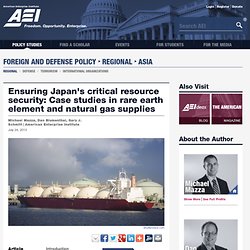
This is especially troubling now compared to recent decades as power dynamics across the Eurasian landmass are in flux, with China, Russia, Iran, and others flexing their muscles or otherwise acting in ways not conducive to a stable international environment. The confluence of these economic and security concerns could prove troublesome for Asia and the United States. Asia’s Evolving Security Environment. China’s growing assertiveness is largely responsible for Asia’s deteriorating security environment—for Japan’s in particular.
Much of Asia continues to feel increasingly unsettled about China’s rise, but perhaps no one state more so than Japan. China’s military investments likewise have Japan concerned. The new middle class revolution: Facts and figures. Visions of Asia's future. Asian business leaders attending a recent forum voiced their belief that Asia will drive the global economy of the future, with the 2015 launch of the Asean Economic Community (AEC) expected to present huge economic opportunities for businesses both within the group's 10 member countries and beyond.
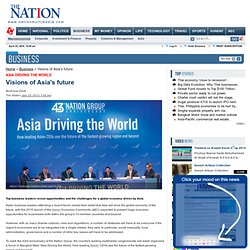
However, with so many diverse cultures, rules and regulations, a number of obstacles will have to be overcome if the region's economies are to be integrated into a single market, they said. In particular, social inequality, local administration, governance and a number of other key issues will have to be addressed. Economic Community. The ASEAN Economic Community (AEC) shall be the goal of regional economic integration by 2015.
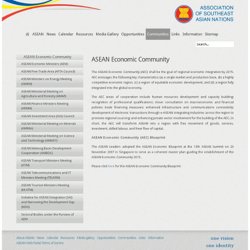
AEC envisages the following key characteristics: (a) a single market and production base, (b) a highly competitive economic region, (c) a region of equitable economic development, and (d) a region fully integrated into the global economy. Reimagining the Internet: The Need for a High-level Strategic Vision for Internet Governance. Paper No. 1 Download PDf As the Internet has become more important, existing stakeholders have identified new interests; new entrants to the policy space, including a number of emerging market states, are bringing their interests and distinct values to bear.
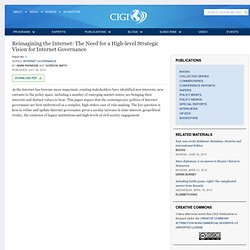
This paper argues that the contemporary politics of Internet governance are best understood as a complex, high-stakes case of rule-making. The key question is how to refine and update Internet governance given a secular increase in state interest, geopolitical rivalry, the existence of legacy institutions and high levels of civil society engagement. RCEP and TPP: Next stage in Asian regionalism. According to a report by the Asian Development Bank (2008), “Asia’s economies are increasingly vital to each other and to the world.
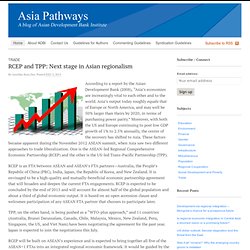
Asia’s output today roughly equals that of Europe or North America, and may well be 50% larger than theirs by 2020, in terms of purchasing power parity.” Moreover, with both the US and Europe continuing to post low GDP growth of 1% to 2.5% annually, the center of the recovery has shifted to Asia. These factors became apparent during the November 2012 ASEAN summit, when Asia saw two different approaches to trade liberalization. Latest Headlines. Globalisation and sustainability: mutually exclusive concepts? > Article. Are globalisation and sustainability mutually exclusive concepts?
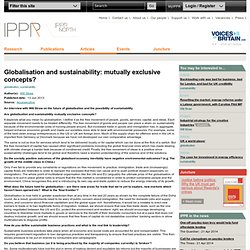
It depends what you mean by globalisation. I define it as the free movement of people, goods, services, capital, and ideas. Each separate movement needs to be treated differently. The free movement of goods and people can place a strain on sustainability because of the environmental costs of moving people around. But increased trade in goods and immigration has, in aggregate, helped enhance economic growth and made our societies more able to deal with environmental pressures. The same is not so true for services which tend to be delivered locally or for capital which can be done at the flick of a switch.
Do the socially positive outcomes of the globalised economy inevitably have negative environmental outcomes? Only if we fail to provide any constraints or regulations on free movement. Asian Century Institute - An e-publication in support of Asia's renaissance in the 21st century. Asia 2050: Realizing the Asian Century. Where is Home? Place, Belonging and Citizenship in the Asian Century. 19th International Conference on The Future of Asia. The Most Innovative Cities in Asia Pacific. Imgw_asia_highspeed. Asia 2030 (defence & security) The Key To Asia’s Future. With Western economies facing serious challenges, regional cooperation, greater intra-Asia trade and development will define the region’s future.
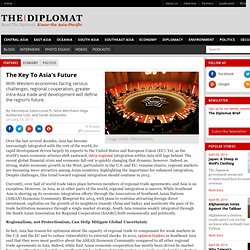
By Véronique Salze-Lozac’h, Nina Merchant-Vega, Katherine Loh, and Sarah Alexander for The Diplomat January 18, 2013 Facebook0 Twitter0 Google+1 LinkedIn0. The future of Asia: Eastern approaches. WHEN you have spent your long diplomatic career listening to lectures by arrogant Americans and Europeans about how others should run their countries and that the West is best, it must be tempting to try to get your own back.
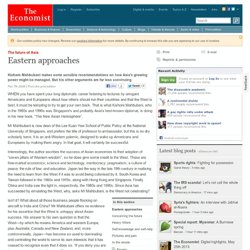
That is what Kishore Mahbubani, who in the 1980s and 1990s was Singapore's and probably Asia's best-known diplomat, is doing in his new book, “The New Asian Hemisphere”. Mr Mahbubani is now dean of the Lee Kuan Yew School of Public Policy at the National University of Singapore, and prefers the title of professor to ambassador, but this is no dry scholarly tome. It is an anti-Western polemic, designed to wake up Americans and Europeans by making them angry. In that goal, it will certainly be successful. 马凯硕:未来会形成亚洲共同体. “我认为亚洲已经崛起了。
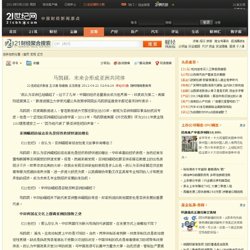
A Future Scenario For Asia. Capacity for economic supremacy is in place, but the Asian Century won’t materialize unless nations address weaknesses, warns Asian Development Bank report The notion that the 21st century is the Asian century must not be taken for granted, warns the Asian Development Bank in a thoughtful and critical document Asia 2050: Realizing the Asian Century .
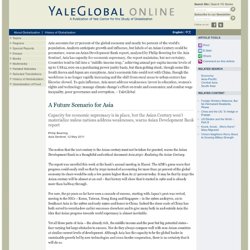
The report was unveiled this week at the bank’s annual meeting in Hanoi. The ADB’s gurus warn that progress could easily stall so that by 2050 instead of accounting for more than 50 percent of the global economy its share would be only a few points higher than its 27 percent today. It may be that by 2050 the Asian century will be almost at an end – that history will show that it started in 1960 and is already more than halfway through. Asia Pacific Foundation of Canada. 亞洲未來的重心是大中華經濟圈 - 天下雜誌367期.